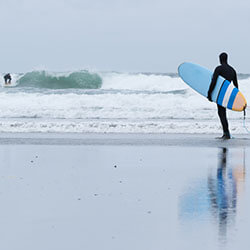 There are people who like living on the edge. They have nerves of steel and boundless energy and are as nimble as a cat. Understandably, many people cast a wary eye on these risk-takers; after all why would anyone want to jump out of perfectly good airplane or race down a quarter mile track at speeds that defy logic? Not surprisingly, your life insurer may be asking these questions as well.
There are people who like living on the edge. They have nerves of steel and boundless energy and are as nimble as a cat. Understandably, many people cast a wary eye on these risk-takers; after all why would anyone want to jump out of perfectly good airplane or race down a quarter mile track at speeds that defy logic? Not surprisingly, your life insurer may be asking these questions as well.
When it comes to life insurance, high-risk recreational activities come with more than just a healthy dose of adrenaline. With life insurance, there's more at play than just your age, overall health, family history and whether or not you smoke-your lifestyle matters too.
On the edge: What counts as an extreme hobby?
No two life insurance companies are the exact same in what they define as a dangerous pastime. Where one life insurer may consider your hobby high risk, another may not. Also, it may not be readily apparent if it's a "hazardous activity" from the get go-often life insurers will take into consideration how often you participate and where, geographically, this hobby takes you. If you regularly take part in any of the following activities (there are others, these are just a few of the most common), your life insurance company's ears will perk up and they'll want to learn more.
 Racing: Many speed-loving enthusiasts spend their weekends testing their reaction and driving skills against other like-minded racers. Whether it's auto, motorcycle, power boat or snowmobile racing, speedways, tracks and courses can be found all over Canada to fulfill the need for speed.
Racing: Many speed-loving enthusiasts spend their weekends testing their reaction and driving skills against other like-minded racers. Whether it's auto, motorcycle, power boat or snowmobile racing, speedways, tracks and courses can be found all over Canada to fulfill the need for speed.
Flying with the birds: Whether piloting a plane, balloon or hang glider or hitching a ride to skydive, the adrenaline rush that comes from taking to the sky is unmatched by any other sport. Apparently, the view is spectacular too.
Rock-climbing and Mountaineering: Legends abound of rugged adventurers who conquer the most daunting peaks to reach new heights, but it's the connection to nature that appeals to most.
 Scuba Diving and Surfing: Tofino, British Columbia may be surf central for Canadian surfers, but there are many top surf spots that make surfing in Canada increasingly popular. The same goes for scuba diving; you don't need to live on the east coast or west coast to get your feet wet as the Great Lakes region is a world-renowned Canadian scuba diving destination if you enjoy wreck diving.
Scuba Diving and Surfing: Tofino, British Columbia may be surf central for Canadian surfers, but there are many top surf spots that make surfing in Canada increasingly popular. The same goes for scuba diving; you don't need to live on the east coast or west coast to get your feet wet as the Great Lakes region is a world-renowned Canadian scuba diving destination if you enjoy wreck diving.
Play it safe and smart with life insurance
Everyone should be free to follow their bliss, whatever that might be, and just because you enjoy living closer to the edge than most doesn't mean you're uninsurable.
Now some people might be inclined to say, "Why tell them I skydive? They don't need to know." It is never a good idea to withhold information because it will affect the validity of your policy. And you don't want to put your loved ones into a situation where there is a potential for a denied claim if you die as a result of an extreme hobby accident. Withholding information or misleading your life insurer about your adrenaline-inducing hobbies is a risk no one should take.
Life on the edge and your life insurance
If a life insurance company considers your hobby high risk, they'll approach it in one of three ways:
- Offer you coverage at a rate higher than the standard life insurance rate.
- Offer you coverage, but exclude your at-risk hobby. What this means, is if you die for a reason unrelated to your extreme hobby, they'll pay out the death benefit, but won't if it is related to your extreme sport.
- Opt not to offer you a life insurance policy.
It is because of this variability that makes it important to do your research, but it doesn't have to be time consuming. At Kanetix.ca, you can easily and quickly compare life insurance quotes and speak with a licensed life insurance advisor who can help you get the coverage you need regardless of how you spend your weekends.




